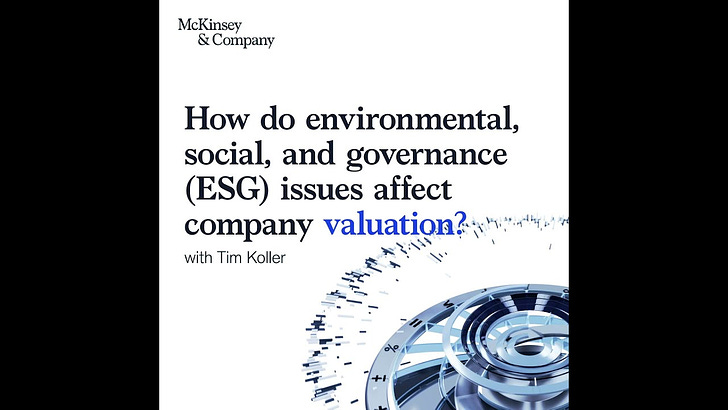I recently posted on the topic of EVA (Economic Value Added), describing the McKinsey approach to economic value creation and recommending that you read two books by McKinsey partner Tim Koller (and others), Value and Valuation.
In response to this blog post, a former McKinsey partner (and friend of mine) sent me a copy of a recent article by Tim Koller and others describing the specific ways in which a healthy focus on ESG (Environmental, Social and Governance) factors can help companies enhance their sustainability and create more economic value for their shareholders. I am sending you the McKinsey article more or less without comment, although I agree with much that is in it. You can read it here: https://www.mckinsey.com/business-functions/strategy-and-corporate-finance/our-insights/five-ways-that-esg-creates-value#
Or better yet, watch this interview with McKinsey author Tim Koller:
ESG investing is very much in vogue today and with good reason. Companies who ignore significant environmental, social and governance matters which impact their business do so at their peril. Not only might they attract unwanted attention from socially-minded activists, they also put at risk the competitive and economic sustainability of their companies over time. And this is something that all shareholders care about, wholly apart from their views on ESG-specific issues.
The recent proxy fight at Exxon illustrates both points. A small activist hedge fund, Engine No. 1, successfully displaced three directors on the Exxon board after convincing a majority of voting shareholders that Exxon’s continued denial of climate-related threats to its business was not only socially irresponsible but more importantly (in the minds of many shareholders) it was also economically short-sighted and demonstrably value destructive. The activists’ case was enhanced by the fact that Exxon had been one of the worst performing oil stocks for several years prior to the proxy fight and also by the fact that not one of the Exxon board nominees had any significant energy industry experience or expertise. You can read about the Exxon proxy fight here: https://www.wsj.com/articles/activist-wins-exxon-board-seats-after-questioning-oil-giants-climate-strategy-11622050087
I also bring to your attention several other ESG documents with which you should be familiar. The first is the “Statement on the Purpose of a Corporation” issued in August 2019 by the Business Roundtable, which purported to redefine long-standing shareholder-centric views of corporate governance with a new focus on creating value for all stakeholders (customers, employees, suppliers and communities) and not just for shareholders. This statement was a big deal at the time it was issued, and the fact that it seems so non-controversial today is a testament to its immediate and pervasive impact. You can read this statement here: https://system.businessroundtable.org/app/uploads/sites/5/2021/02/BRT-Statement-on-the-Purpose-of-a-Corporation-Feburary-2021-compressed.pdf
The second document I bring to your attention is the 2018 Letter to CEOs written by BlackRock CEO Larry Fink, in which he describes BlackRock’s then-new approach to corporate governance engagement with the companies in which it invests on behalf of its own fund investors. This too was a big deal at the time and I can attest from personal experience as a public company director that the continuing ESG efforts of Mr Fink and BlackRock have definitely gotten the attention of public company CEOs and their boards. You can read Mr. Fink’s statement here: https://www.blackrock.com/corporate/investor-relations/2018-larry-fink-ceo-letter
Finally, I recommend to all of you interested in the subject of corporate governance, Warren Buffett’s classic summary of the principles by which he runs Berkshire Hathaway, the BRK Owners’ Manual, which you can find here: https://www.berkshirehathaway.com/owners.html
Warren Buffett may not be the first name that comes to mind when you think about ESG investing, at least not the “E” and “S” components, but Mr. Buffett has always been very sound and outspoken on the “G” component (governance). And in this context, we should keep in mind that Berkshire Hathaway’s core business is insurance, and specifically property-casualty insurance. I can think of few other businesses that are as directly impacted by climate change as this one, which has not escaped Mr. Buffett’s attention. No doubt Warren Buffett’s primary corporate governance concern remains the welfare (and wealth) of BRK’s shareholders, but he has consistently made clear that the way in which he runs BRK is and will continue to be heavily impacted (and constrained) by the fiduciary duties that BRK owes to the policyholders (customers) of its various insurance subsidiaries. I do not know Mr. Buffett’s personal views on the Business Roundtable Statement of Corporate Purpose, although I suspect he is not a fan. But I also cannot think of a better practical example of the proper application of the Business Roundtable “stakeholder” principles than that articulated and demonstrated by Mr. Buffett with respect to BRK’s various insurance businesses.
Corporate governance is an important topic of great interest to me and you should expect more posts along these lines.


